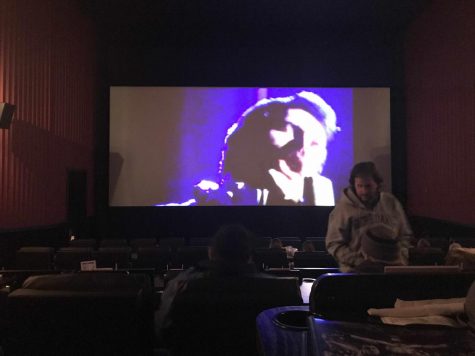Bohemian Rhapsody worth the money for Malek, Sing-Along
November 27, 2018

Community members across generations take their seats at the Alamo Cinema. The theatre played old clips of Queen as audience members waited for “Bohemian Rhapsody” to begin.
In yet another stellar Hollywood portrayal of the gay community, the new Queen biopic felt slightly more like a sit-down concert than the hard hitting film on Mercury’s experiences that it so desperately wanted to be. Definitely worth ticket money, but entirely different than the trailer would have one believe.
Bohemian Rhapsody, released Nov. 2, aimed to cover the period of Mercury’s life from the conception of Queen to the Live Aid Concert of 1985. Rami Malek (Mercury) delivered another fantastic, and near flawless, performance, while the screenplay left a lot to be desired.
It’s not that the film was terrible. Malek’s performance was phenomenal, especially accompanied by the acting chops of his bandmates (Ben Hardy, Joseph Mazzello and Gwilym Lee), as well as Queen’s manager (Tom Hollander).
Old and young alike were dancing in their seats, and there was even a smattering of applause for the climactic Live Aid concert. Perhaps Vox’s Aja Romano put it best.
“[The film] isn’t trying to be a biopic about Mercury’s life,” she wrote. “What it really wants to be is a Queen concert, and what it really wants Freddie Mercury to be is a rock god instead of a real, queer human man.”
Mercury was complex – if Hollywood had wanted a rock god, they should have focused on the drummer, seemingly just an extremely attractive playboy. To an audience member who had minimal existing knowledge of Mercury’s life, the film felt confusing. Very little contextualization was given. Dramatic irony was rampant (to you youngsters, a quick spoiler: Queen was very successful).
The cinematography represented the turmoil of Mercury’s emotions brilliantly, but the actual script failed to explain the apparent resolution of that turmoil.
It would be nice if Hollywood would stop and think about how it looked for Mercury to be seemingly corrupted by his experiences with the LGBTQ+ community (whether it be gay bars, other gay men, or crossdressing). It would have been nice if Hollywood had shown the Queen concert for Live Aid. All of it. It would have been nice, even, for them to focus on the actual phenomenon of Queen, the remnants of which it obviously wanted to tap into. Luckily, the name alone filled seats.
“Certain groups like Queen transcend, I think,” social studies teacher Matthew Kiedrowski said. “Prince just passed away; he certainly transcends, to socio-economic levels, generation. There’s certain groups or people or music that just forever will be there.”
Kiedrowski added, “For youth, there has to be some rebellion in in the language. That’s what makes the connection. When you’re that teenager, that’s when you feel like challenging authority. It’s like your job. Eventually that disappears once real life slaps in the face mid 20s. If there’s that component in the music, then it will always transcend. The rebellion part of every teenage group will be there.”
Rebellious high schoolers can certainly attend this film, but be prepared to be confused by the sprinkling of plot in between musical numbers. Queen’s music remains just as captivating as it was at their height. Even if you’re totally lost, you’re never much more than five minutes away from a dance break which really make the whole thing worth it.













Q.C. • Dec 21, 2018 at 8:29 am
This article hits the nail on the head of how I felt watching the movie. Bohemian Rhapsody made me want to stand up and sing along, which I would have had I not been in a movie theater on a date. The article hits hard with the facts, which have even more affect if you had watched the movie. Kiedrowski’s quote really resonated with how music is for me, even if I’d rather not be labelled as rebellious.
James Stahl • Dec 21, 2018 at 8:19 am
Good job on this story Abby and congrats on Best-of-SNO. I really enjoyed reading this story, as you show your emotion through your writing and I can hear your voice as I read. Your ‘snarky’ comments were greatly appreciated.